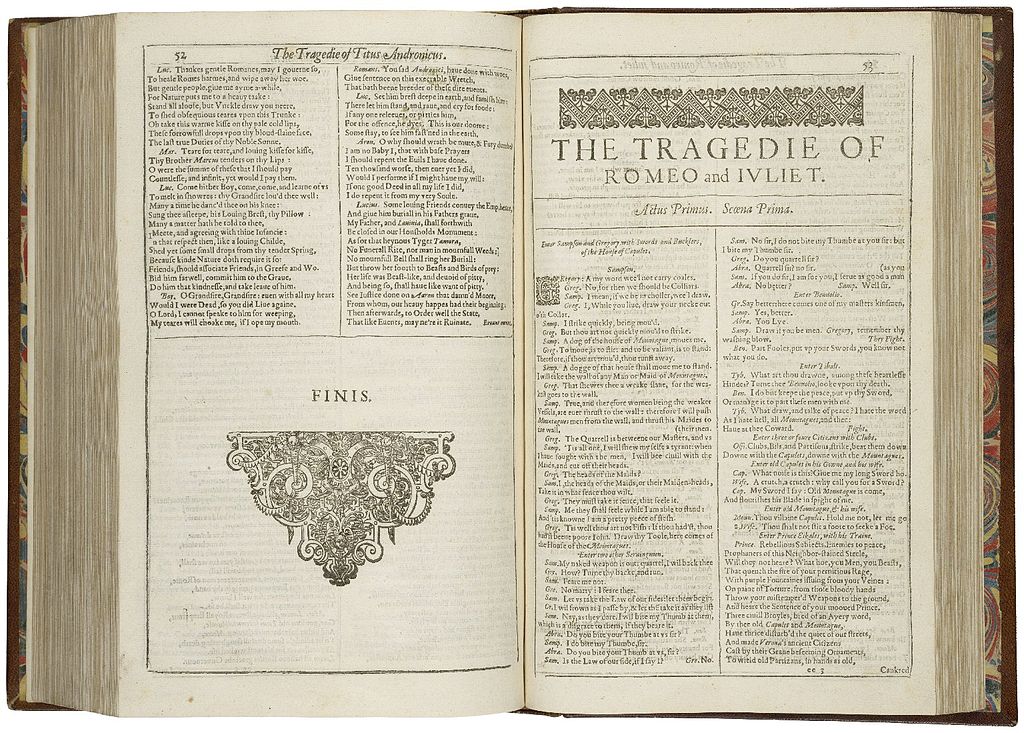
Act III continued
Scene 2
The first twenty-five lines of Juliet’s speech that open this scene is another option for the girls’ memorization project. Shakespeare uses the Nurse’s obtuseness to create dramatic irony as Juliet struggles to deal with the meaning of her ambiguous wailing. Juliet’s brief happiness is shattered; her speech with all its oxymorons conveys her anguish and despair. When Juliet desperately decides to hang herself, the Nurse replies that she will tell Romeo to join his bride that night. A point to emphasize is this: The fact that Romeo has killed a member of Juliet’s family makes it even more difficult for the lovers to tell their parents about their marriage.
Scene 3
Both the Friar and the Nurse have nothing but bad news for Romeo—exile and Juliet’s sorrow. Although Romeo is naturally grief-stricken, we fault him for his rashness and loss of control that convey his immaturity. He succumbs to self-pity, he grovels on the ground, and when he hears that Juliet is distraught, he attempts to commit suicide. It’s important to follow the Friar’s plan: Romeo will briefly comfort Juliet then leave for Mantua. The Friar will reconcile the two families, tell them of the marriage, and ask the Prince to pardon Romeo so that he can return to Verona, and the lovers will live happily ever afterwards. But this is not a fairy tale, and that’s obviously not what happens.
Scene 4
The Capulets and Paris continue to be unaware of Juliet’s marriage to Romeo and naturally assume she is grieving over Tybalt’s death—a further instance of dramatic irony. Another complication arises when Lord Capulet decides his daughter will marry Paris in three days’ time, on Thursday. In the circumstances, this appears to be a reasonable decision. We know that Lord Capulet approves of the Count as a son-in-law, and apparently Paris genuinely loves Juliet. Also, Juliet has given no indication that she is unhappy about marrying the Count.
Scene 5
This is a powerful, emotionally challenging scene. The brief conversation between the lovers again emphasizes Romeo’s tragic flaw—his rashness as well as Juliet’s practical realism. Again, Shakespeare foreshadows the tragic ending when Juliet refers to death: “Methinks I see thee, now thou art so low, / As one dead in the bottom of a tomb.”
Dramatic irony continues with Lady Capulet’s assumptions that her daughter is distraught over Tybalt’s death and that the news of marriage to Paris will cheer Juliet. Also ironic is Lady Capulet’s repeated belittlement of Romeo. When Juliet refuses to marry the Count, her parents’ reactions are horrifying. Her father heaps abuse on her and disowns her. A few lines later, her mother too abandons her daughter. One should realize, however, that Lord Capulet is not usually abusive; when he heaps abuses on Juliet, his wife is horrified because Lord Capulet’s reaction is uncharacteristic. Also, he is deeply saddened by Tybalt’s death and frustrated by his daughter’s apparent willfulness. Juliet’s parents are unwise, but, as already noted, they are not mere stage villains.
Equally horrifying is the Nurse’s insensitive comparison of Romeo to Paris and her brazen suggestion that Juliet commit bigamy by marrying Paris. The Nurse has always been Juliet’s friend, but from this point on, she loses Juliet’s respect. Juliet is deserted by everyone she has depended on. As far as she is concerned, her situation is hopeless. If the Friar can offer no suggestions, she will commit suicide. Regarding the Capulets’ parenting skills, the invariable consensus is that Juliet’s parents are insensitive and overbearing and that they don’t stop to discover what their daughter really feels. If they had been more compassionate and loving, they would surely have found out about her marriage to Romeo. This scene provides an opportunity to talk with teenagers about the alleged generation gap and the need to maintain a close relationship with one’s parents.
The major issues in Act III are these:
- the turning point
- the Nurse and the Friar’s responses to Juliet and Romeo respectively
- the Capulets’ treatment of their daughter
- the developing characters of both lovers
- Romeo’s tragic flaw
About the Author
Written by Elizabeth McCallum Marlow
I taught all aspects of the English curriculum at various colleges and private schools for 35 years. I now want to give back what I learned in the classroom about conveying to students a love for literature and a desire to write cogently. I would love to receive comments and questions that can be addressed to me at www.eamarlow0103@gmail.com.

